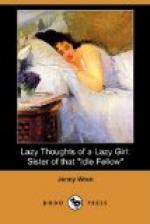CHAPTER I.
On love.
“Love is of man’s
life a thing apart;
’Tis woman’s whole
existence.”
So sings the poet, and so agrees the world. Humiliating as it is to make the confession, it is undeniably true. “Men and Dress are all women think about,” cry the lords of creation in their unbounded vanity. And again, we must submit—and agree—to the truth of the accusation; at any rate, in nine cases out of ten. Fortunately I am a tenth case; at least, I consider myself so. I don’t dispute the “dress” imputation. I am very fond of dress. Nearly as fond of it as the twenty-year old youth, and saying that, I allow a good deal. But very few of my thoughts are given to the creature “man”! I do not think him worth it. As my old nurse used to say, “I never ’ad no opinion of the sex!”
Do not conclude, however, that because of my statement that I am a disappointed, soured old maid, for I am nothing of the sort. I am on the right side of twenty-five, and I have never been crossed in love; indeed, I have never even experienced the tender passion, and only write from my observations of other people; thus taking a perfectly neutral ground in speaking of it at all.
One never hears that Adam fell in love with Eve, or that Eve was passionately attached to Adam. But then, poor things, they had so little choice—it was either that or nothing. Besides, there was no opposition to the match, so it was bound to be rather a tame affair. For my part, I pity Eve, for Adam was, I think, the very meanest of men. When he was turned out of the garden, what a wretch he must have felt himself! and how he must have taunted his poor wife! Weak men are always bullies.
But “revenons a nos moutons,” I am wondering who was the first person to fall in love! Cain might have done so with his mysterious wife; history does not say. But certainly there is always some attraction in mystery, so such a thing is possible. I wonder whence that extraordinary woman sprang!
Neither do we hear much of Noah’s domestic experiences, but I should conclude on the whole that they were not happy. No man could be endured for forty days shut up in the house, no business to go to, nothing to do, always hanging about, his idle hands at some mischief or other, and last, but not least, a diabolical temper, displayed at every turn! Why, I cannot endure one for a week! My only wonder is that the female population of the Ark did not rise up in a body and consign their lords and masters to the floods.
Poor men, they deserve a little of our pity too, perhaps; for if Mrs. Noah and her daughters-in-law at all resembled their effigies in the Noah’s Arks of the present day, they were women to be avoided, I think.
So that, after all, it must have been Jacob who set such a very foolish example; because we could not count Isaac, his being so extraordinary and isolated a case, when he fell in love with his own wife!




